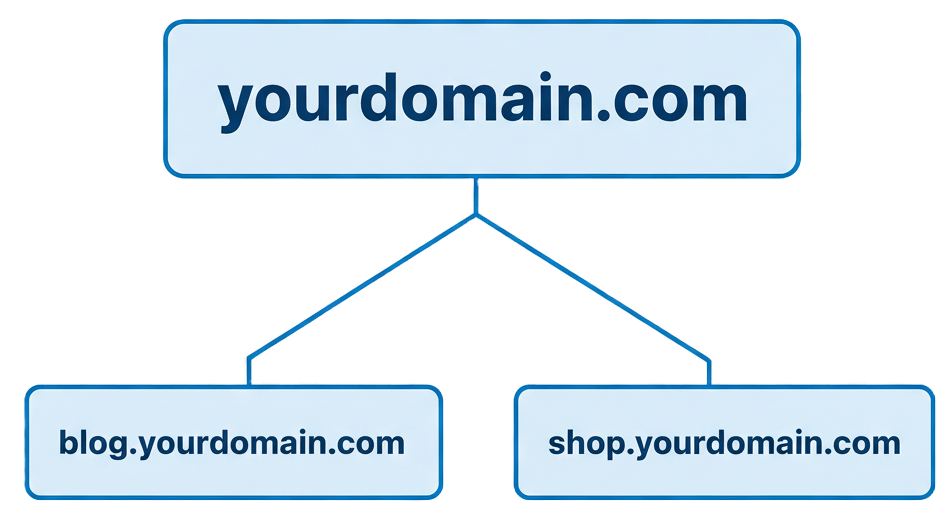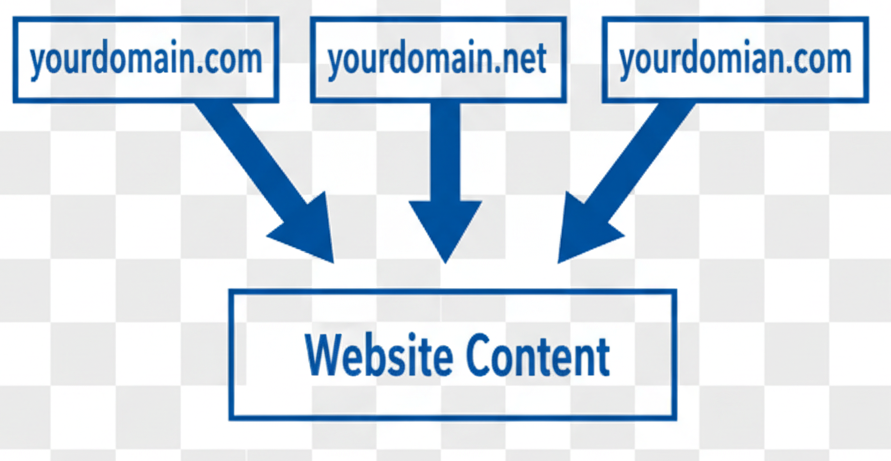Applies to: All hosting clients using CWP (Control Web Panel).
Overview
When managing your website hosting in CWP, you'll see options for adding "Addon Domains," "Parked Domains" (sometimes called Aliases), and "Subdomains." While they all relate to domain names, they serve very different purposes.
Understanding the difference is key to organizing your websites and making sure visitors end up in the right place.2 This guide breaks down each type.
1. Subdomains: Organizing Sections of Your Main Site3
Think of a subdomain as creating a new section within your existing website, accessible via a prefix.
-
Definition: A subdomain adds a prefix to your main domain name, separated by a dot.
-
Format:
prefix.yourdomain.com -
Purpose: To organize or separate distinct sections of your main website.
-
Examples:
-
blog.yourdomain.com(for your blog) -
shop.yourdomain.com(for your online store) -
members.yourdomain.com(for a members-only area) -
support.yourdomain.com(for a help desk)
-
-
How it Works: In CWP, creating a subdomain typically creates a new folder inside your main
public_htmldirectory (e.g.,public_html/blog). The content you place in this folder becomes the website for that subdomain. It functions as a separate website but is clearly part of your main domain identity. -
Key Point: You do not need to register a new domain name to create a subdomain.

2. Addon Domains: Hosting Completely Separate Websites
Think of an addon domain as adding a completely new and independent website to your same hosting account.
-
Definition: An addon domain is a separate, fully functional domain name that you've registered (e.g.,
anotherdomain.com) and want to host alongside your primary domain (yourdomain.com) under the same CWP account. -
Format:
anotherdomain.com(a completely different domain name) -
Purpose: To host multiple distinct websites from a single hosting plan, without needing separate accounts.
-
Examples:
-
You have
yourbusiness.comand want to addyourhobbyblog.netto the same account. -
You own
widgetstore.comand also want to hostgadgetworld.org.
-
-
How it Works: When you add an addon domain in CWP, it creates a new folder within your home directory, often outside the main
public_html(e.g.,/home/youruser/anotherdomain.com). This folder becomes the root directory for the new website. Visitors going toanotherdomain.comwill see the content from this folder and won't know it's hosted on the same account asyourdomain.com. -
Key Point: You must register the addon domain name separately (with WebOptex.com) before you can add it in CWP. You also need to point its nameservers to your hosting account.

3. Parked Domains (Aliases): Different Doors to the Same House
Think of a parked domain as creating multiple addresses that all lead to your one primary website.
-
Definition: A parked domain (often called an "Alias" in modern CWP/cPanel) is a domain name that you own but doesn't have its own website content. Instead, it displays the exact same content as your primary domain (or another specified domain on your account).
-
Format:
differentdomain.com(another domain you own) -
Purpose:
-
To catch common misspellings of your main domain (e.g.,
yourdomian.compoints toyourdomain.com). -
To use multiple domain extensions (e.g.,
yourdomain.netandyourdomain.orgboth show the content ofyourdomain.com). -
To hold a domain for future use while still having it lead somewhere.
-
-
How it Works: When a visitor goes to the parked domain (
differentdomain.com), they see the website content from your primary domain (yourdomain.com), but the address bar still showsdifferentdomain.com. It's not a redirect (which would change the URL in the address bar). -
Key Point: You must register the parked domain name separately. You also need to point its nameservers to your hosting account.

Summary Table
| Feature | Subdomain | Addon Domain | Parked Domain (Alias) |
| Example | blog.yourdomain.com |
anotherdomain.com |
yourdomain.net |
| Purpose | Section of main site | Completely separate site | Different name for main site |
| Website Content | Unique content in its own folder | Unique content in its own folder | Shows content of another domain |
| New Domain Registration Needed? | No | Yes | Yes |
| Folder Location (Typical) | Inside public_html |
Outside public_html |
Points to another domain's folder |
| Visitor sees different URL? | Yes (prefix.yourdomain.com) |
Yes (anotherdomain.com) |
Yes, shows the parked domain URL |

